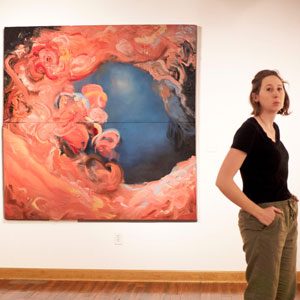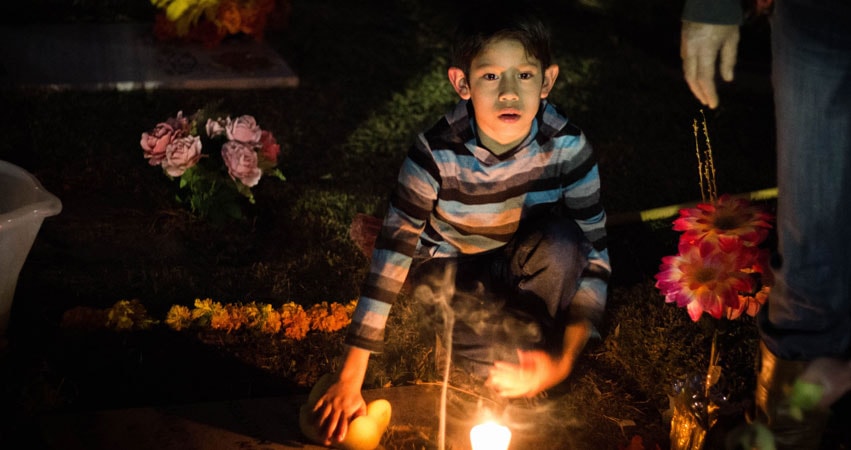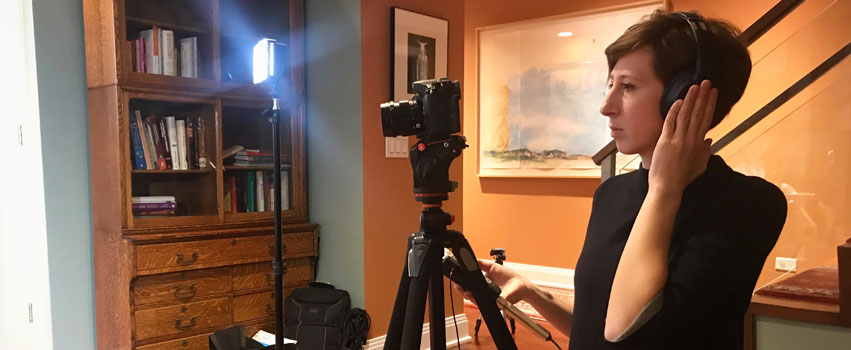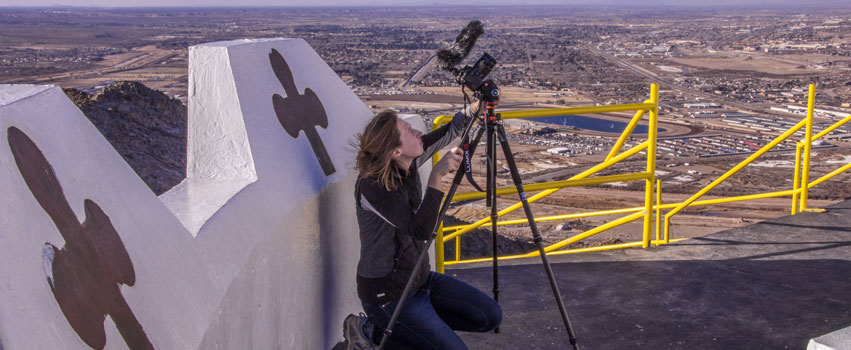In this age of unrelenting social media hot takes, streaming videos and click-bait articles, it is easy to feel surprisingly informed. According to Forbes, 2.5 quintillion bytes of data are produced daily—and 90 percent of the data available today was produced in the last two years alone. But how do we sort through this sea of information… and break free of our own circles of influence?
Films are unique in that they present information—whatever the subject matter—in a way that engages multiple senses. Instead of just someone’s words, you are invited to look into their eyes, observe their body language and visualize the context as well.
Documentaries, far from dull or stiff, have unquestionably changed how we see the world. They plunge viewers into a life that is not their own, introducing them to new ideas (legitimate or otherwise) that can be inspiring and sometimes uncomfortable. Here in Peoria, a local filmmaker is embarking on her own journey to document the social issues of the Midwest.
Lines of Success
Allison Walsh grew up in the Chicago suburbs, where she was heavily involved in competitive golfing. When it came time to search for a university, an active golf team was a must. “I originally picked Bradley University for the golf team—I wasn’t an artist at the time,” she says, laughing. “It is always funny to see how things unfold.”

She initially pursued a degree in the history department. “I wanted to be a high school teacher, a social science teacher… and ideally, I wanted to teach world religions,” she recalls. After taking a figure drawing class, however, she was hooked—and quickly decided to shift her academic focus. “I saw the way that changed the perspective of how I see things… and I couldn’t get enough of it.”
Walsh was passionate about learning, and painting offered her the toolbox she needed to grow personally and professionally—not only to learn new techniques and ideas, but to communicate her own. “I wasn’t searching any more for what I wanted to do,” she explains. “I wanted to do art.”
She graduated from Bradley with a BFA in painting, a BA in Spanish and a philosophy minor—even as her focus began shifting toward film. It was 2016, and Walsh had just witnessed one of the most divisive election cycles in U.S. history. “I wasn’t happy with the rhetoric that was really elevated at the time,” she says, recalling her desire to contribute to a better conversation. “I thought I could make a painting, but that was my voice. So I figured, ‘I’m going to make a documentary!’ That is what ignited the rest of my career.”
Her concept was to document the stories and experiences of residents living along the U.S.-Mexico border in El Paso, Texas, and Juarez, Chihuahua, but she found it difficult to get her first project started. “I had been trying to fund [the project] for a couple of months and it wasn’t really working. I had no experience—I just owned a camera. I decided to do a Kickstarter,” she says of the online fundraising platform. “That was in November of 2016.”
Within two months, Walsh had raised the necessary funds. She flew to El Paso on January 2, 2017. Relying on the connections of two cousins who lived there, as well as online sources, she began to identify residents for interviews. “I felt like El Paso was very similar to Peoria, where once you start meeting people, they trust you—and introduce you to all these other people. I got to know people pretty quickly and filmed in El Paso for two-and-a-half weeks the first time. I ended up going back a couple months later.”
Walsh interviewed dozens of residents, but chose to focus on the stories of Olga Perez, a formerly undocumented maid, and Chuck Foss, a former U.S. border patrol agent, who respectively live in the border towns of Juarez and El Paso. While their occupational histories might appear to put them at odds, their stories revealed a much more complex relationship between those who police the border and those who cross it—“which also includes compassion, respect and a shared daily existence,” Walsh observes.
The film, entitled Parallel Lines, premiered at Peoria’s Prairie Center of the Arts. “That was one of the most powerful moments I’ve had in my artistic career—maybe in my life,” she recalls. Her efforts were duly rewarded: the film was nominated for “Best Documentary” at the Paris Art and Movie Awards and was an official selection at Festival Sayulita. For someone just beginning her career, it was a spectacular start.

Storytelling on Film
Because Walsh serves as director, cinematographer and editor for all of her films, the timelines of her projects are far from linear. She worked on several films during the same year as Parallel Lines, including Iron Man and Iron Woman (2017), a short documentary film about a Peoria couple who competes in Ironman triathlons while maintaining high-profile jobs and community leadership roles; Food for Thought/Who’s Missing (2017), produced for Peoria Public Radio about the Mexican migrant workers who harvest pumpkins in nearby Morton; and Bus 15, a documentary about riders of Peoria’s CityLink buses, in which the passengers narrate where they are going, where they are coming from and what challenges they are trying to overcome.
More recently, Walsh directed Enes Kanter and the Importance of Education (2018), a video about education and religious literacy from the perspective of NBA basketball star and social justice advocate Enes Kanter, and The Daily Aesthetics of Alexander Martin (2018), an exploration of Martin’s gender expression as a queer drag artist living in Peoria.
To support her work as a documentary filmmaker, Walsh also works as a freelance videographer. “It’s a great way to do what I love for a living, and also do something that I’m passionate about,” she explains. “The line is blurred between work and my passion projects, which is great.”
Walsh recently worked with the City of Peoria to create a four-part video series that shares how its Innovation Team addresses the city’s biggest challenges through creative and strategic approaches. “I got to tell stories of amazing things happening in Peoria that I didn’t know about,” she notes. “And because I’m making a video, I get to create a space where other people can learn about these amazing stories.”
Besides serving on the board of the Peoria Art Guild, Walsh has taught film classes for Peoria Public Schools and is heavily involved in the Big Picture Film Festival. She considered moving back to the Chicago area upon graduating from Bradley, but Peoria’s arts scene kept her here—specifically Yaku, the artistic collaborative working to repurpose the Hale Memorial Church on West Main Street as a cultural center. “I really don’t think I would be in Peoria if I didn’t see the community that Yaku had, and the way I saw a future for myself as an artist in Peoria.”

Currently an intern for Kartemquin Educational Films in Chicago, Walsh is also in the midst of pre-production work for her first feature-length documentary. “It’s about a world religions class at a public high school in the Chicago suburbs,” she notes. It’s a class she took herself—and one that she feels changed her life. “I really believe that what we need for our next generation is to be a more compassionate and educated country. It’s all about how to talk to people with core differences… and how to think critically.” She hopes to hold fundraisers in both Peoria and Chicago over the summer.
Though her focus has shifted from painting to film, Walsh says her early experience as a painter had a direct impact on her filmmaking. “There is a connection I feel between the two mediums. I think when people see my documentary—especially Parallel Lines and The Daily Aesthetics of Alexander Martin—they know that it was made by an artist. I care about creating a sensory experience,” she notes. “There is a connection with what I can do with a painting and the movement that I apply paint with… I’m able to actually move the camera with similar movement.”
Walsh’s primary goal—to use her work for local political and arts advocacy and to document social issues in the Midwest—is not only commendable, it’s a necessity. “Documentary films give us a platform to tell our story—not only across the world, but in our own city,” she says. “In Peoria I’ve had the privilege to create films about drag queens, gun violence and immigration. Through these experiences, I’ve had the pleasure of meeting many incredible people who call this place home and exploring the work yet to be done to make our community the one we all know it can be.” PM
For more information, visit allisonwalshartist.com.




